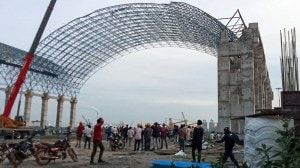Stay updated with the latest - Click here to follow us on Instagram
Stubble burning — Action taken against 2,923 farmers, but Centre should step in to resolve crisis, says Punjab CM
On Sunday, the CM in a statement said that the Punjab government had initiated action against 2,923 farmers so far in 20,729 cases of stubble burning reported till November 1, and predicted a 10-20 per cent decline this year as compared to last year, due to intensified drives to stop the practice.
 A policeman wearing a mask manages traffic amid heavy smog in Patiala on Sunday. PTI
A policeman wearing a mask manages traffic amid heavy smog in Patiala on Sunday. PTI
Punjab Chief Minister Capt Amarinder Singh on Sunday said the Centre has to step in and find a consensus to resolve the crisis of pollution caused by stubble burning.
The move came days after he called Delhi Chief Minister Amarinder Singh a “shameless liar” for for blaming farm fires in Punjab for pollution, and a day after he wrote to Prime Minister Narendra Modi admitting that stubble fires and wind direction were partly to blame.
On Sunday, the CM in a statement said that the Punjab government had initiated action against 2,923 farmers so far in 20,729 cases of stubble burning reported till November 1, and predicted a 10-20 per cent decline this year as compared to last year, due to intensified drives to stop the practice.
While it had received reports of around 49,000 cases of stubble burning last year, the state government said that this year, 20,729 cases have been reported till now, with more than 70 per cent of the paddy having already been harvested.
“Despite the high court having stayed the recovery of fines from farmers penalised last year, the state government has intensified its drive against the dangerous practice of stubble burning,” the statement said.
Enforcement teams had till November 1 visited 11,286 sites where stubble burning was taking place. Environment compensation amounting to Rs 41.62 lakh was imposed in the form of fines in 1,585 cases, “red entries” were made in Khasra Girdawaris (land revenue documents) in 1,136 cases, and prosecution/FIR filed in 202 cases against defaulting farmers.
The process of verifying the remaining fire incidents and levying environmental compensation was being expedited, said the chief minister, adding that the Punjab Pollution Control Board had also imposed environmental compensation of Rs 62 lakh in connection with 31 combine harvesters being operating without super straw management system (SMS), a technology that chops up the paddy straw into small pieces, making it easier to clear the stubble with the help of other machinery, instead of resorting to burning.
These steps were not, however, sufficient to check the problem, as majority farmers in Punjab had less than 5 acres of land, making it economically unviable for them to go for high-end ways of
managing stubble.
In staying the process of recovery of penalties imposed last year, the high court had taken note of the “growing indebtedness of marginal farmers and the serious issue of farmer suicides, and had chosen “not to add any further financial woes on farmers,” the court had stated, while ordering that punitive actions may go on in due course of the law.
Compensation by the Centre was the only solution in the circumstances, said Amarinder, adding that the matter was not one of politics, but “a question of the future of our people, which goes beyond politics”. The ball is in the Centre’s court since most state governments were bankrupt, with his own state reeling under massive debt, the CM said, adding that the fiscal situation was linked to GST, which had aggravated their economic problems.
Asserting that his government was “fully seized of the problem” and “working committedly” to put a stop to the practice, the CM said he hoped Prime Minister Narendra Modi will understand and respond positively to his letter “on the grave issue of the worsening Delhi air pollution”.
While admitting that Punjab was also contributing to the Delhi smog due to the westerly upper winds, including those coming from Pakistan, Capt Amarinder said that to put the blame entirely on his state was “absolutely incorrect.” Statistics showed that parameters on the factors relating to pollution were higher in Delhi, he added. Instead of addressing the problem, Delhi Chief Minister Arvind Kejriwal was playing political games, Amarinder claimed, asking what the AAP leader was doing on ground to resolve the issue.
The situation had aggravated in recent years as production of paddy had increased, with the last two years reporting record production in Punjab, even though the state’s people were traditionally not rice-eaters, according to the chief minister, who further said that cities in the state were also enveloped by smog. Underlining the need to change the cropping pattern by weaning farmers away from paddy, he reiterated his demand for MSP for other crops to help promote diversification.







